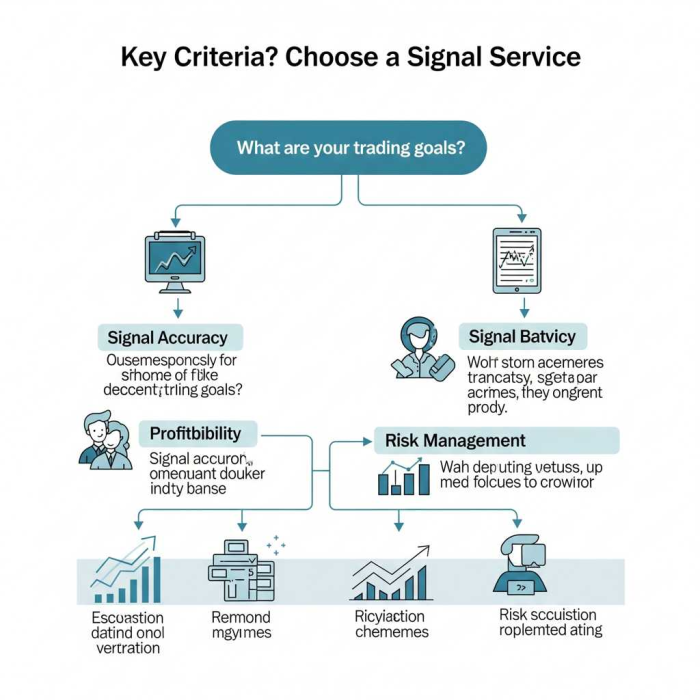Finding Your North Star | Key Criteria for Choosing a Signal Service
In the exciting, fast-paced world of trading, signal services can feel like a secret weapon. They promise to cut through the noise, identify profitable opportunities, and simplify your trading decisions. But with a plethora of options available, how do you pick the right one? Choosing a signal service isn't a one-size-fits-all endeavor; it's about finding a partner that aligns with your trading style, risk tolerance, and financial goals.
So, before you jump in, let's explore the key criteria you should consider when making this crucial decision.

1. Transparency and Verifiable Performance
This is paramount. A reputable signal service will be completely transparent about its past performance. Look for:
- Verifiable Track Record: Do they provide access to audited trading statements or a third-party verified track record (e.g., Myfxbook, FXBlue)? Screenshots or self-proclaimed success stories are often unreliable.
- Detailed Statistics: Beyond just win/loss ratios, look for metrics like average win/loss, maximum drawdown, profit factor, and recovery factor. These give you a much clearer picture of their risk management and consistency.
- Realistic Expectations: Be wary of services promising astronomical, consistent returns with no drawdown. Trading involves risk, and even the best traders experience losses.
2. Trading Style and Strategy Alignment
Signal services often specialize in particular trading styles or asset classes. Consider:
- Asset Class: Do they focus on Forex, cryptocurrencies, stocks, commodities, or a mix? Choose a service that aligns with the markets you want to trade.
- Timeframe: Are the signals geared towards scalping, day trading, swing trading, or long-term investing? Your preferred trading frequency should match their approach.
- Strategy Clarity: Do they explain the underlying strategy behind their signals? While you don't need to be an expert in their methodology, understanding their general approach helps you assess its suitability.
3. Risk Management and Drawdown
No strategy wins 100% of the time. How a service manages risk is critical:
- Stop-Loss and Take-Profit Levels: Do their signals consistently include clear stop-loss and take-profit levels? This is essential for managing your risk per trade.
- Maximum Drawdown: Understand their historical maximum drawdown. Can your capital and emotional fortitude withstand similar downturns?
- Risk-Reward Ratio: Do their trades generally offer a favorable risk-reward ratio? This is crucial for long-term profitability.
4. Communication and Support
Even with the best signals, questions and issues can arise:
- Signal Delivery: How are signals delivered (email, Telegram, dedicated platform, etc.)? Is the delivery method reliable and timely?
- Customer Support: Is there readily available customer support? How responsive are they? Do they offer educational resources or guidance on using their signals effectively?
- Community: Do they foster a community where users can share experiences and ask questions?
5. Cost and Value Proposition
Signal services come with a price tag, but don't just look at the raw number:
- Pricing Structure: Is it a monthly subscription, a one-time fee, or performance-based?
- Trial Period: Do they offer a trial period so you can test their signals before committing?
- Value for Money: Does the potential for profit and the quality of their service justify the cost? Be realistic about how much capital you can deploy and what kind of returns you need to make the service worthwhile.
6. User Reviews and Reputation
While individual experiences can vary, collective feedback can be insightful:
- Independent Reviews: Look for reviews on independent forums, trading communities, and reputable review sites.
- Red Flags: Be wary of services with consistently negative reviews, complaints about non-transparency, or a high number of scam accusations.
- Longevity: Services that have been around for a while with a consistent track record often indicate reliability.
Conclusion
Choosing a signal service is a significant decision that can impact your trading journey. By diligently evaluating services based on these key criteria, you'll be better equipped to identify a partner that not only provides valuable insights but also aligns with your overall trading philosophy and helps you navigate the markets with greater confidence. Remember, thorough research and a healthy dose of skepticism are your best allies in this process. Happy trading!
Popular Tags